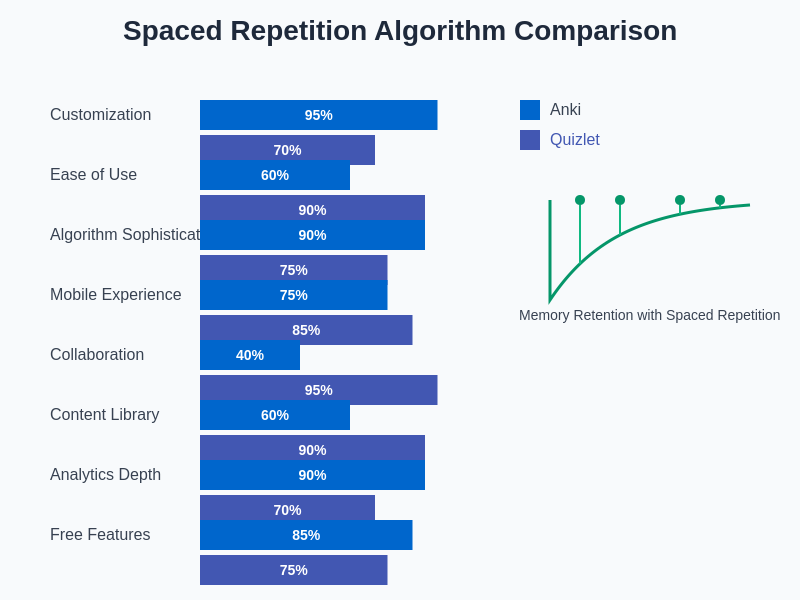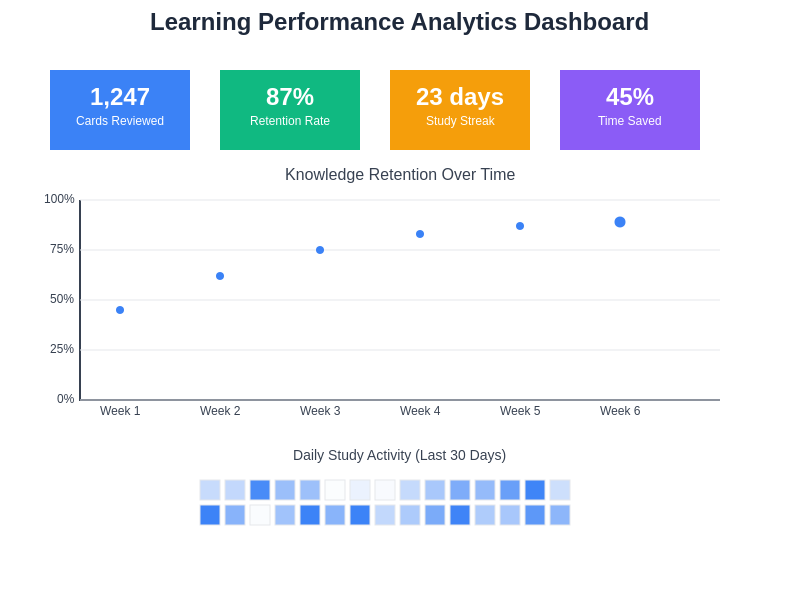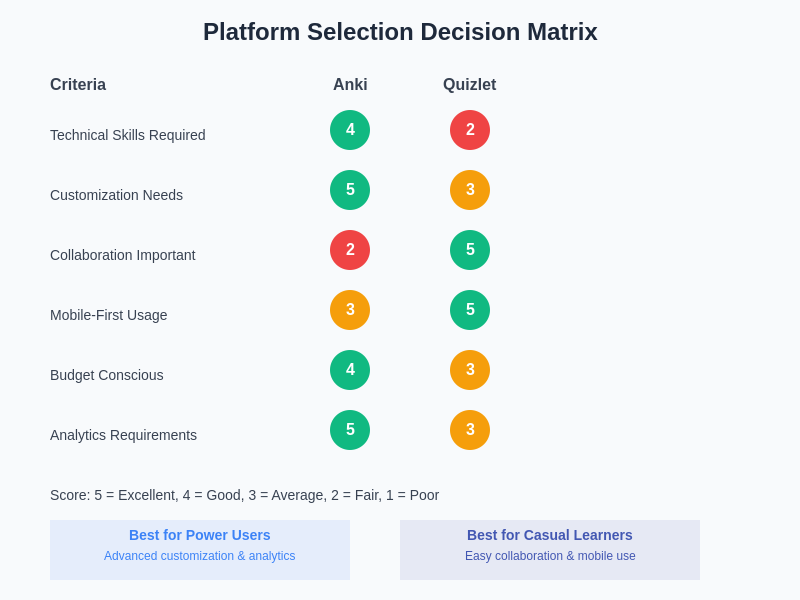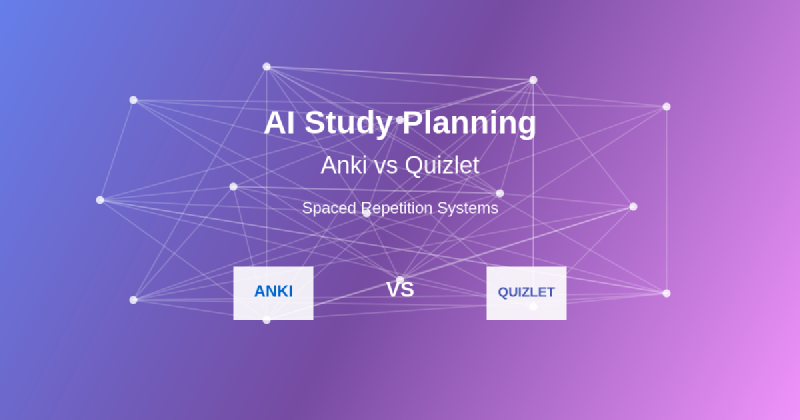The integration of artificial intelligence into educational technology has fundamentally transformed how individuals approach learning and knowledge retention, with spaced repetition systems emerging as powerful tools that leverage cognitive science principles to maximize learning efficiency. Among the most prominent platforms in this space, Anki and Quizlet have established themselves as leading solutions that combine sophisticated algorithms with user-friendly interfaces to create personalized learning experiences that adapt to individual cognitive patterns and optimize long-term memory formation.
Explore the latest AI educational trends to discover cutting-edge technologies that are reshaping how we acquire and retain knowledge in the digital age. The evolution of spaced repetition systems represents a significant advancement in educational methodology, moving beyond traditional rote memorization techniques to embrace scientifically-backed approaches that work in harmony with natural human memory processes.
Understanding Spaced Repetition and Cognitive Science
Spaced repetition represents one of the most scientifically validated learning techniques, rooted in decades of cognitive psychology research that demonstrates how strategic timing of review sessions can dramatically improve long-term retention rates. The fundamental principle underlying this approach recognizes that human memory follows predictable patterns of decay, with newly acquired information experiencing rapid initial forgetting unless reinforced through strategic review sessions timed to occur just before the information would otherwise be lost.
The Hermann Ebbinghaus forgetting curve, first documented in the late 19th century, revealed that without reinforcement, newly learned information experiences exponential decay, with approximately 50% of new knowledge being lost within the first hour and up to 90% disappearing within a week. Spaced repetition systems counteract this natural forgetting process by presenting information for review at increasingly longer intervals, with each successful recall strengthening the memory trace and extending the time before the next review becomes necessary.
Modern AI-powered spaced repetition platforms have sophisticated this basic principle by incorporating machine learning algorithms that analyze individual learning patterns, response times, difficulty ratings, and success rates to create personalized review schedules that optimize learning efficiency for each user’s unique cognitive profile. These systems continuously adapt based on performance data, ensuring that challenging material receives more frequent attention while well-mastered content is reviewed less often, maximizing the efficient use of study time.
Anki: The Powerhouse of Customizable Learning
Anki has established itself as the gold standard for serious learners who demand maximum control over their study experience, offering an extraordinarily flexible platform that allows users to create highly customized flashcard systems tailored to specific learning objectives and subject matter requirements. The platform’s strength lies in its open-source foundation, which has enabled a vibrant community of developers and educators to create thousands of add-ons, templates, and shared decks that extend the system’s capabilities far beyond basic flashcard functionality.
Experience advanced AI learning with Claude to enhance your study planning and content creation for optimal knowledge retention. The sophisticated nature of Anki’s spaced repetition algorithm, based on the SuperMemo SM-2 system with additional refinements, provides users with granular control over interval calculations, difficulty adjustments, and review scheduling parameters that can be fine-tuned to match individual learning preferences and subject-specific requirements.
The platform’s multimedia capabilities enable users to create rich learning experiences that incorporate images, audio recordings, video clips, and complex formatting that supports diverse learning styles and subject matter ranging from language acquisition to medical education. Advanced users can leverage Anki’s powerful template system to create dynamic flashcards that automatically generate multiple question formats from a single input, significantly reducing the time required to create comprehensive study materials while ensuring thorough coverage of important concepts.
Anki’s synchronization capabilities across multiple devices ensure that learning can continue seamlessly regardless of location or device availability, with progress and performance data automatically synchronized across desktop computers, smartphones, and tablets. The platform’s robust statistics and analytics provide detailed insights into learning patterns, retention rates, and time investment, enabling users to make data-driven decisions about study strategies and identify areas requiring additional attention.
Quizlet: Accessibility Meets AI Intelligence
Quizlet has revolutionized accessible learning by creating an intuitive platform that combines powerful spaced repetition algorithms with a user-friendly interface designed to accommodate learners of all technical skill levels and educational backgrounds. The platform’s strength lies in its ability to make advanced learning techniques accessible to mainstream audiences while maintaining the scientific rigor necessary for effective knowledge retention and skill development.
The AI-powered features integrated throughout Quizlet’s ecosystem demonstrate sophisticated understanding of learning psychology, with intelligent study modes that automatically adapt to user performance and learning patterns. The platform’s Learn mode employs machine learning algorithms to identify knowledge gaps and adjust question difficulty in real-time, ensuring that study sessions remain appropriately challenging without becoming overwhelming or discouraging for learners at various skill levels.
Quizlet’s collaborative features enable seamless sharing of study materials and facilitate group learning experiences that leverage collective knowledge and peer support to enhance individual learning outcomes. The platform’s extensive library of user-generated content provides immediate access to high-quality study materials across virtually every academic subject and professional discipline, significantly reducing the time investment required to create comprehensive study resources from scratch.
The gamification elements integrated throughout Quizlet’s interface create engaging learning experiences that maintain motivation and encourage consistent study habits through achievement systems, progress tracking, and social features that enable healthy competition among peers. These elements are carefully balanced to enhance rather than distract from the core learning objectives, ensuring that entertainment value supports rather than undermines educational effectiveness.
Comparative Analysis of Algorithm Sophistication
The fundamental differences between Anki and Quizlet’s algorithmic approaches reflect their distinct design philosophies and target audiences, with each platform optimizing for different aspects of the learning experience while maintaining effectiveness in promoting long-term knowledge retention. Anki’s algorithm provides maximum flexibility and customization options, allowing advanced users to fine-tune every aspect of the spacing calculation to match their specific learning patterns and subject matter requirements.

The mathematical precision of Anki’s interval calculations enables users to achieve optimal learning efficiency through careful adjustment of algorithm parameters, with options to modify ease factors, interval multipliers, and difficulty bonuses based on individual performance patterns and learning objectives. This level of control appeals particularly to serious students and professionals who require maximum efficiency from their study time and are willing to invest effort in system optimization.
Quizlet’s algorithmic approach prioritizes simplicity and automatic optimization, with machine learning systems that continuously analyze user behavior patterns to make intelligent decisions about review timing and question selection without requiring manual intervention or technical expertise. This approach democratizes access to sophisticated spaced repetition techniques by eliminating the learning curve associated with algorithm customization while maintaining effectiveness for the majority of users.
Enhance your research capabilities with Perplexity to access comprehensive information for creating effective study materials and understanding complex topics across diverse subject areas. The platform’s ability to synthesize information from multiple sources can significantly enhance the quality and depth of study materials created for both Anki and Quizlet systems.
Content Creation and Management Capabilities
The process of creating and managing study content represents a critical factor in determining the long-term success of any spaced repetition system, with both platforms offering distinct advantages that cater to different user preferences and workflow requirements. Anki’s content creation system provides unparalleled flexibility for users who require sophisticated formatting options, multimedia integration, and complex card templates that can accommodate diverse subject matter and learning objectives.
The platform’s support for HTML, CSS, and JavaScript enables advanced users to create interactive study materials that incorporate dynamic elements, mathematical equations, and complex visual layouts that enhance comprehension and retention. The ability to create custom note types and field configurations allows users to design study systems that perfectly match their specific learning requirements and subject matter constraints.
Quizlet’s content creation process emphasizes efficiency and ease of use, with streamlined interfaces that enable rapid creation of high-quality study materials without requiring technical expertise or extensive formatting knowledge. The platform’s AI-powered content suggestions and automatic definition generation can significantly accelerate the creation process while maintaining accuracy and relevance for most subject areas.
The collaborative creation features available in Quizlet enable teams of students or educators to contribute to shared study sets, with version control and editing permissions that facilitate group projects and peer review processes. This collaborative approach can result in more comprehensive and accurate study materials while distributing the workload among multiple contributors.
Performance Analytics and Learning Insights
Both platforms provide sophisticated analytics systems that enable users to track their learning progress and identify areas requiring additional attention, though they differ significantly in the depth and complexity of the data provided. Anki’s statistical system offers comprehensive insights into learning patterns, including detailed graphs showing retention rates, review times, card maturity distributions, and interval success rates that enable advanced users to optimize their study strategies based on empirical data.

The granular nature of Anki’s analytics enables users to identify specific types of content or question formats that present particular challenges, allowing for targeted adjustments to study strategies and content creation approaches. The ability to export detailed performance data enables integration with external analysis tools and facilitates research into personal learning patterns and optimization strategies.
Quizlet’s analytics system focuses on providing actionable insights through user-friendly visualizations that highlight progress trends, mastery levels, and areas requiring additional focus without overwhelming users with excessive detail or technical complexity. The platform’s intelligent recommendations based on performance patterns help guide study session planning and content prioritization to maximize learning efficiency.
The social analytics features available in Quizlet provide insights into comparative performance among peer groups and class participants, enabling healthy competition and collaborative learning experiences that can enhance motivation and engagement while providing additional context for individual performance evaluation.
Integration Capabilities and Ecosystem Support
The ability to integrate spaced repetition systems with existing educational tools and workflows represents an increasingly important consideration for students and professionals who rely on diverse technological solutions to support their learning objectives. Anki’s open architecture and extensive API support enable integration with a wide variety of third-party applications, browser extensions, and educational platforms that can automate content creation and enhance the overall learning experience.
The platform’s support for import and export operations across multiple file formats facilitates seamless integration with existing study materials and enables migration between different learning systems when necessary. The extensive library of community-developed add-ons provides solutions for specialized requirements ranging from advanced statistics to integration with specific educational platforms and content management systems.
Quizlet’s integration capabilities focus on supporting common educational workflows and popular learning management systems used in academic and corporate environments. The platform’s native integration with Google Classroom, Microsoft Teams, and other educational platforms enables seamless incorporation into existing institutional workflows while maintaining the benefits of sophisticated spaced repetition algorithms.
The mobile application ecosystem surrounding both platforms demonstrates their commitment to supporting modern learning patterns that span multiple devices and environments, with native applications that maintain full functionality across smartphones, tablets, and desktop computers while ensuring consistent user experiences and seamless synchronization of learning progress.
Cost Considerations and Value Proposition
The economic aspects of choosing between spaced repetition platforms involve careful consideration of both immediate costs and long-term value propositions, with each platform offering different pricing structures that reflect their distinct target audiences and feature sets. Anki’s unique pricing model provides free access to desktop applications while charging for mobile applications, reflecting the platform’s open-source heritage and community-driven development model.
The one-time purchase model for Anki’s mobile applications can represent excellent long-term value for serious learners who plan to use the system extensively over extended periods, particularly when compared to subscription-based alternatives that accumulate costs over time. The lack of ongoing subscription fees eliminates concerns about service discontinuation or price increases that could disrupt established learning routines.
Quizlet’s freemium model provides substantial functionality at no cost while offering premium subscriptions that unlock advanced features such as offline access, detailed analytics, and enhanced study modes. This approach enables users to evaluate the platform’s effectiveness before committing to paid subscriptions while ensuring that basic spaced repetition functionality remains accessible to users with limited financial resources.
The enterprise and educational institution pricing options available for both platforms reflect their recognition of organizational learning requirements and the value of systematic knowledge management in professional and academic environments. These specialized offerings often include enhanced collaboration features, administrative controls, and integration capabilities that justify higher price points for institutional users.
Subject-Specific Applications and Use Cases
The effectiveness of spaced repetition systems varies significantly across different subject areas and learning objectives, with both Anki and Quizlet demonstrating particular strengths in specific educational domains. Language learning represents one of the most successful applications for both platforms, with the natural fit between vocabulary acquisition and flashcard-based review systems creating highly effective learning experiences for students at all proficiency levels.
Medical education has embraced Anki with particular enthusiasm, with the platform’s flexibility and customization options enabling the creation of sophisticated study systems that accommodate the complex, interconnected nature of medical knowledge. The ability to create custom templates that link anatomical images with clinical presentations and diagnostic criteria demonstrates how advanced users can leverage Anki’s capabilities to create comprehensive learning experiences that mirror real-world application requirements.
Professional certification and continuing education programs have found significant value in both platforms, with the ability to create focused study materials that target specific competency requirements and regulatory standards. The analytics capabilities of both systems enable learners to demonstrate mastery levels and track progress toward certification requirements in ways that satisfy both personal learning objectives and institutional documentation needs.
Academic subjects ranging from mathematics and sciences to humanities and social studies have benefited from the systematic approach to knowledge retention provided by spaced repetition systems, with educators increasingly incorporating these tools into curriculum design and assignment structures that leverage their effectiveness for improving long-term learning outcomes.
Future Developments and AI Enhancement
The continued evolution of artificial intelligence technologies promises to bring significant enhancements to spaced repetition systems, with both platforms actively investing in machine learning capabilities that will further personalize and optimize the learning experience. Natural language processing advances are enabling more sophisticated content analysis and automatic question generation that can reduce the time investment required for creating high-quality study materials.
Adaptive learning algorithms are becoming increasingly sophisticated in their ability to model individual learning patterns and predict optimal review timing based on factors beyond simple performance metrics, including cognitive load, time of day, and contextual learning environment. These advances promise to make spaced repetition systems even more effective while reducing the cognitive overhead required for manual scheduling and optimization.
The integration of voice recognition and natural language interaction capabilities is opening new possibilities for hands-free study sessions and more natural interaction patterns that can accommodate diverse learning preferences and accessibility requirements. These developments are particularly promising for language learning applications where pronunciation and listening comprehension represent critical skill components.
Collaborative AI features that enable intelligent content sharing and peer learning optimization represent another frontier for development, with systems that can automatically identify complementary study materials among peer groups and suggest optimal collaboration strategies based on individual learning patterns and shared objectives.
Making the Optimal Choice for Your Learning Goals
The decision between Anki and Quizlet ultimately depends on individual learning preferences, technical comfort levels, and specific educational objectives that should be carefully evaluated in the context of available time investment and desired outcomes. Users who prioritize maximum customization and control over their learning experience, particularly those with technical skills and specific optimization requirements, will likely find Anki’s flexibility and power worth the additional complexity involved in system setup and maintenance.

Learners who value simplicity, collaborative features, and immediate accessibility may find Quizlet’s streamlined approach and intelligent automation more suitable for their needs, particularly if they prefer to focus on content learning rather than system optimization. The platform’s extensive library of existing content and social features can provide significant value for users who benefit from peer interaction and shared learning experiences.
The hybrid approach of using both platforms for different purposes represents a viable strategy for learners with diverse educational requirements, with Anki serving specialized subjects requiring intense customization while Quizlet handles more general learning objectives and collaborative study sessions. This approach leverages the unique strengths of each platform while minimizing the limitations inherent in any single system.
Regardless of platform choice, the key to success with spaced repetition systems lies in consistent daily practice, thoughtful content creation, and willingness to adjust study strategies based on performance feedback and changing learning objectives. The scientific principles underlying these systems are robust and well-validated, making any properly implemented spaced repetition approach significantly more effective than traditional study methods for achieving long-term knowledge retention and mastery.
Disclaimer
This article is provided for informational purposes only and does not constitute professional educational advice. The effectiveness of spaced repetition systems may vary based on individual learning styles, subject matter, and implementation approaches. Users should evaluate their specific needs and preferences when selecting learning platforms and consider consulting with educational professionals for guidance on optimal study strategies. The platforms discussed may change their features, pricing, or availability, and readers should verify current information before making decisions based on this content.
